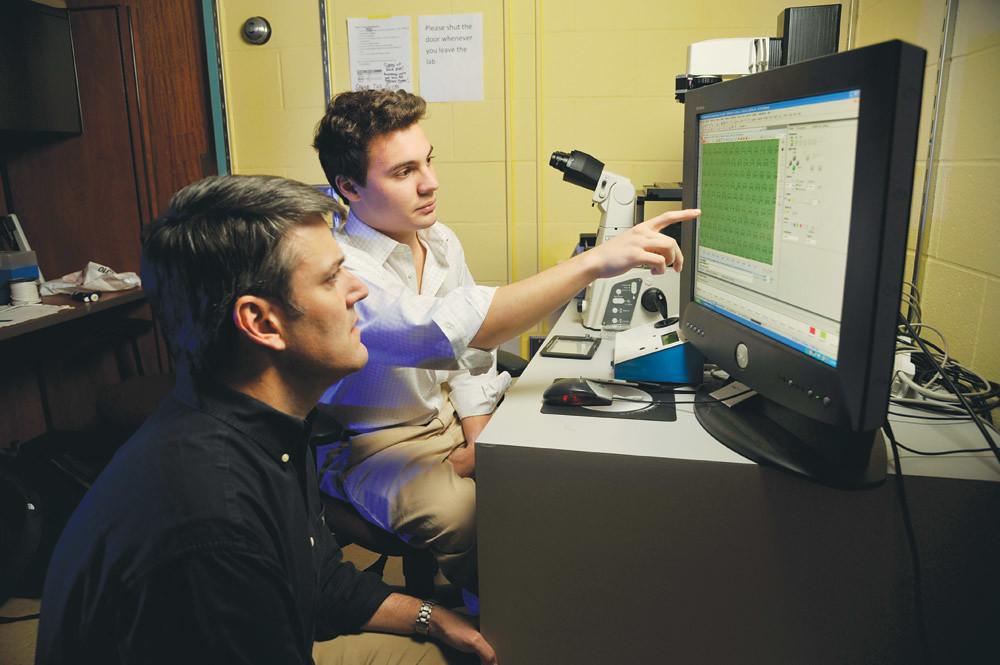Curious about how to become a research scientist? If you love research and want to step into this fulfilling career, I can help.
I will reveal everything about this job now. Then, you can discover your skills and experience needed for it. So keep scrolling down! The exciting journey is waiting for you!
Overview of a Research Scientist
Before digging into the main part of your journey, explore what this job entails first. After that, you will understand the job requirements in more detail so you can take appropriate preparation steps.
Who is a Research Scientist?
A research scientist is a professional who conducts research and experiments. Then, they explore new technologies and improve the current theories.
The research scientist works on data. They also interpret their findings to develop theories and hypotheses. Thus, they contribute to technological development.
There are also other scientists on the team. So, the research scientist has to collaborate with their colleagues to provide the best results.

What Does A Research Scientist Do?
The research scientist has many tasks to do. Even so, the exciting challenges this job gives me every day keep me engaged. Let me tell you some of my daily tasks so you can understand more about research science.
- I plan and conduct experiments. Then, I write reports on what I have observed. If needed, I also suggest solutions to improve the current situation.
- I also collect samples. Sometimes, I need to carry out different types of fieldwork.
- There are junior staff in my team. Thus, as a senior research scientist, I supervise their performance. More specifically, I monitor and record their experiments. If they need my help, I don’t mind giving a hand.
- Technology is developing so fast. Hence, I have to stay up-to-date with the latest trends.
- I also work with other researchers. We have meetings to work on tricky issues during our research.
Where Do Research Scientists Work?
I work at a college and spend most of my time in the lab. My job involves using specialized tools and machines.
However, the working environment can be different depending on your field. For example, if you choose biology, you will work with living specimens in the lab. Meanwhile, if your major is psychology, your office only has computers.
How To Become A Research Scientist
You can become a research scientist once you are confident of what you have. Here are eight steps to take until then.
1. Choose your career path
Firstly, you have to choose your career path. As I said, the working environment may vary depending on your field. Your job requirements will be different, too.
There are two categories to consider:
Industry
If you want to work for big companies, choose this path. As an industrial research scientist, you will develop and improve products to grow your company.
Imagine you work for a medicine business. Your company needs you to conduct research and test new drugs.
Career prospects for this job are the same as other positions in the company. It means you can climb your career ladder with experience. You may also become a manager.
Academic
I chose this career. If you want to become an academic research scientist like me, you will work for government agencies or universities.
Your research offers valuable data for an industry. However, your findings may not have a direct influence on product creation.
Most academic research scientists are also professors. They teach some classes while conducting their research.
Career progression for this job is promising, too. If you are a professor, you can advance to a more senior position. You can even obtain tenure.

2. Earn your graduate degree
Your goal is clear now, so start your journey by getting a degree! Your educational path depends on your chosen career.
For example, if you like to work with biology or chemistry, consider a degree in these majors:
- Pharmacology
- Biology
- Biochemistry
- Pre-med
On the other hand, if you want to become a data research scientist, you must be proficient in computers. Thus, a degree in IT or computer science will be what you need.
3. Obtain your certifications
Your degree can highlight the knowledge needed for your future job. However, I highly recommend taking certifications. Each focuses on a certain aspect of your field. So check these options and choose your favorite:
Statistics for Researchers (from Indian Statistical Institute)
This online course educates learners about important concepts of academic research. During the course, you can develop your statistical skills, too.
The program lasts only four days. Yet, experts in the field guide the lessons. Their live interactive sessions will surely help you earn in-depth knowledge.
Quantum Mechanics (from StanfordEdx)
This course focuses on quantum mechanics. It also digs into some practical applications.
After registration, you can access study materials and online lectures. There are also graded exams. Once you complete all the assessments, you can get a certificate.
Research Methods (from Futurelearn)
If you want to work on ethical projects, choose this course. It covers relevant research techniques, ethics, and questions. The effective learning atmosphere is another plus.
You can finish and get a certificate in ten weeks. However, since this program is self-guided, you can speed it up.
4. Accumulate experience
The more experience you earn, the better you perform at work. There are three ways to gain practical experience:
Internships
Taking an internship gives you a chance to observe the whole research process. You will even be part of it.
During the internship, you can also collaborate with professional researchers in your field. They may train you on doing research and give you tips to bring out the best of it.
The salary for an intern is not high due to your lack of experience. However, do not aim for money here. Trust me! The lessons you get during this time can bring you a lot of money in the future.
Volunteering
If there are any volunteering projects at school, join them. You can work on your own and collaborate with your friends.
But please note that volunteering doesn’t pay you. Sometimes, you even have to spend money on your projects. But again, experience is more valuable than salary in this case.
Entry-level jobs
You can also try an entry-level job in the industry. Working as a research assistant is the best way to try.
Unlike the other two methods, this job pays you. However, it asks for some prerequisites, depending on the organization you work for.

5. Grow your network
Networking is important for your job. A good connection with experts in the field can give you more job opportunities. They will also help you keep up with the latest trends to apply in your research.
To expand your network, you can join conferences and meetups. Researchers gather there to discuss the hottest topics in their niche. If you are part of them, you can join the conversation. Remember to keep their contact info. You may need to get in touch with them then.
Consider online communities, too. You can join Facebook groups or forums. Once you’ve become a member, be active in talking about your problems and share interesting things. Others may see and interact with your post.

6. Hone your skills
Skills are as crucial as knowledge. The skills below will help you succeed in your research scientist role.
Data analysis
You will conduct research and experiments. This duty requires you to gather and analyze data to give a conclusion. Thus, data analysis is one of the first skills to hone.
Communication
You have to explain your findings to other technicians and scientists. Hence, you need good verbal communication skills.
After that, you will write reports about your work. Sometimes, you have to prepare grant proposals to ask for funding for your research. Both tasks require good written communication skills.
Critical thinking
Problems may arise during your research. In this case, you have to use your critical thinking to find the cause and solve them soon. Otherwise, they will affect your progress.
Attention to detail
Working with data is tricky because a tiny mistake will lead to a wrong conclusion. So, as a research scientist, you must pay attention to every detail.
Patience
Patience is not exactly a skill, but it’s super important for a research scientist. Your project may take months. Without patience, you may quit.
I used to be an impatient person. But I trained myself to become one. I always try to think about the optimistic side of things. This way, I can feel more motivated and conduct research again and again.

7. Apply for a research scientist job
Once you’ve got all the skills above, you can apply for a research scientist job. You just need to send your cover letter and resume to your potential employer. However, obstacles may show up in your way. Sometimes, you need months to land an ideal job.
But fear not, as everyone has the same problem. So, do not worry about your future. Instead, just try to find the right path. You can find jobs on LinkedIn or Glassdoor. Companies often post their job vacancies and seek talents there.
Sometimes, they post their recruitment on social media or official websites. You should start to follow their pages now. Then, whenever they need new employees, you will receive a notification.

8. Consider higher education
You already have a bachelor’s degree. This education is generally enough for a research scientist position. However, when working in this role, you can consider a master’s degree. It will surely help you upgrade your skills and raise your salary range.
And if you want to become a lead scientist, pursue a doctorate after your master’s program. It takes about four to five years to finish.
Job Outlook
This job is high-paying. According to ComputerCareers, research scientists in the USA can earn up to $162,587 per year (in 2024).
The job outlook depends on what type of research you choose. For example, in the medical industry, research scientists are in demand. Research is necessary to fight against diseases.
The demand for this job in technology is even higher. Companies have to find new techniques to improve their products. The risk of cyber security also increases their need for research.
Is A Research Scientist A Good Career?
Yes. This career is ideal for those who love research. When taking this role, you have chances to research your favorite topic. The finding then will be your best rewarding experience.
Plus, this job is in high demand. Many industries require skilled research scientists for different purposes. Hence, you will have many job opportunities.
Pros And Cons
This job is promising. Unfortunately, you will have both benefits and drawbacks.
Benefits
- You will receive good job security and a high salary.
- This job may allow you to travel to research institutions and conferences.
- You can contribute to the development of many industries.
- This job is satisfying when you see how others apply your research to real cases.
Drawbacks
- You have many duties. Sometimes, you have to work during the weekends and overnight.
- The stress level is high.
- This job is highly competitive. Competitions for funding are also challenging.
Wrapping Words
The career path will be tough and unique. You have many things to do. Continuous learning is also part of your job. Yet, if it’s your passion, you can become a successful research scientist.
This job is on the rise. So everything you put effort into will bring about rewards. Keep working, and you will succeed!
